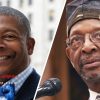by Todd Steven Burroughs
Once upon a time, from 1968 to 1973, there was a public television show called “Soul!” that had the budget and the courage to present 360 degrees of “uncensored, undiluted Blackness.” A recent “Soul! Summit” explored ways to recreate a media miracle, brought forth by a people’s struggle.
Ellis Haizlip and “SOUL!”: The Day the Blues People Created and Shaped “Black Power Public Television”
by Todd Steven Burroughs
“Ellis Haizlip was determined to show Black humanity.”
The past is, by its very nature, elusive, often shaped in hidden fragments and placed in the mind’s backdoor. But there are times when memories loom so large they rise to the surface and demand attention. It is not just dreams deferred that explode; sometimes it’s the dreams realized, albeit briefly, that violently splits time in half—for example, the time before we saw ourselves truly and the time after. The mystery and the beauty of what happened in between our own B.C. and A.D. is the transformative power of Black art and, on a good day, Black media.
Last Friday’s “SOUL! Summit,” held in the boardroom of PBS flagship WNET/Thirteen and sponsored by the National Black Programming Consortium, was a day filled with that kind of vibe. “SOUL!” (1968-1973) was a breathtaking, very Black PBS culture showcase that pre-dated its more commercial and (a little) less radical little cousin, “Soul Train.” “SOUL!” was produced at WNET/Thirteen. Both shows, spearheaded by bold Black men, were opportunities to allow Black artists to perform in Black venues for Black audiences. Both shows were successful efforts by Blacks to shape and control the presentation of Black culture. Both host/producers, Ellis Haizlip and Don Cornelius, respectively, are Ancestors in 2013. But it’s the more commercial product, the one that lasted decades longer, that fills the now-commercialized memory.
Melissa Haizlip is trying mightily to change that. The word, to repeat, is trying, because she is struggling to get the finances to make her film on her very influential late uncle, a man that poet Umar Bin Hassan emphasized was determined to show Black humanity.
She and the film, “Mr. Soul! Ellis Haizlip and the Birth of Black Power TV,” don’t lack for content, as the above clip shows. And she sure doesn’t lack friends: the summit was a mini-Black writers-activists conference in itself: Abiodun Oyewole and Bin Hassan (famous members of The Last Poets), Movement icon Sonia Sanchez, well-known scribes Quincy Troupe, Ericka Blount Danois and Kevin Powell, among others. What she lacks is money. The daylong conference was a tribute to her uncle and the Black Power and Black Arts movements that pushed him onto local, then national, television to powerfully-but-coolly shake black-and-white into color.
“The summit was a mini-Black writers-activists conference in itself.”
Ellis Haizlip was slowly reconstructed through clips and memories of stories told. “He knew nothing about television. He didn’t like it. So he was perfect,” recalled Christopher Lukas, former programming director for WNET/Thirteen. Lukas hired Haizlip, a very well-known and –connected theatre producer in Black circles who had what became known as a legendary black phone book of contacts. So Thirteen’s first Black producer evolved Lukas’ idea of a “Black Tonight Show” into “SOUL!” Haizlip produced and Stan Lathan, now a legend in Black Hollywood, directed.
Haizlip was cool, sly—“an instigator,” said Thulani Davis, who, as a young college student, was in the “SOUL!” audience and would later work with Haizlip. The dapper host “didn’t get in the way” of his subject, said former National Urban League head Hugh Price, who also was a former senior vice president for WNET/Thirteen, post-“SOUL!” (Sanchez said that before Haizlip, she had “never seen a man ask a question, then retreat.” Lukas said he initially thought he was in trouble when Haizlip would respond to a guest’s answer with a “Right on!” or a giggle.) Several panelists talked about Haizlip’s smooth way of following up if a guest evaded a question. Lukas recalled how he and Haizlip had to reassure a frightened WNET/Thirteen president and Kenneth Clark, the Black psychologist who tended to gatekeep, about the content of the program before it even aired. Haizlip was the mouthpiece of the different types of Blackness, said John H. Bracey, Jr., chairperson of the W.E.B. Du Bois Department of Afro-American Studies at University of Massachusetts at Amherst. He said Haizlip’s philosophy with the show was that “’all of this (I’m presenting) is going to get us Black, so you (the audience) sort it out.’”
I remember an old Village Voice article about “SOUL!” written by Lisa Jones. (It was indeed in the “old”Village Voice, which, once upon a decade, had strong Black writers like Jones and Davis as the norm.) Jones mentioned that Haizlip always referred to himself on-air as the “producer of ‘SOUL!,’” which, in my view, made the same point Cornelius made. (“Control what you do,” emphasized Troupe, who defined himself as a “cultural worker” and pushed for all of us to take over the means of cultural production.) Lukas did admit that when “SOUL!” expanded from WNET/Thirteen to PBS, Haizlip was “more careful” and the program’s content was more edited. And then it was gone, as PBS started to become the elite, homogenized network it is now.
“It became a vehicle demanding respect, searching for opportunity and giving voice.”
“Soul!” was undiluted and uncensored 360 degrees of Blackness. It was the kind of program where George Jackson’s mother appeared, talking about her then-recently martyred son; where Louis Farrakhan was asked about politics and sexuality; where Al Green performed, and talked, to the Blackest audience I had ever seen; where Davis was just two feet away from Maurice White and his then-relatively new elemental band, because the audience was part of the show; where Miriam Makeba sang while a dancer interpreted her tune; where the Last Poets proudly chanted, “Die Nigger….so Black people can take over!”; where Black people sat down in front of the television and watched other Black people in the audience watch other Black people onstage, with whites just providing the sound, the picture and the electricity. “It became a vehicle demanding respect, searching for opportunity and giving voice,” said Price. Sanchez talked about how people would come up to her the day after she performed on “SOUL!” and asked her, “’Aren’t you that lady?’ And I said, ‘Yes, wasn’t we bad?’”
In the late 1960s, Black public affairs television programs such as “SOUL!” and “Black Journal,” its PBS news/public affairs sibling, aired nationally on the public television network, and other shows were created, produced and aired locally on local public and commercial television stations across the country. All that happened because of a very specific reason: Black people rebelled in the streets in Detroit and Newark and Watts and everywhere in America between 1964 and 1968, demanding justice. That justice included demands for real images of themselves on local and network television, then a five-to-six channel medium with lead Blacks represented by “Julia” and Bill Cosby, with occasional glimpses of supporting sister Lt. Uhura. President Johnson commissioned a report to find out the causes of the rebellions, and then suppressed it when it told the truth—that white racism caused and fueled it. The report’s media chapter (summarized here) made white media executives at WNET/Thirteen and other places across the nation think about their responsibilities as licensed custodians of the nation’s airwaves. Some, like Lukas, even let Black people like Haizlip do what they wanted. The very idea—that un-corporatized people on mass-received television would be allowed do what they pleased with six-figure budgets, influencing a potential audience of hundreds of thousands of people—seems as dated as an eight-track player or the evening newspaper.
“No one has permission to be as Black as Haizlip anymore on public or commercial television, local or national.”
Throughout the day, several panelists talked about the idea of permission to broadcast Black content: how Haizlip had it, how we have it now (somewhat) with the new technology, and how we can use it. They lamented that PBS has become more corporate today, politely saying while sitting in the land of Elmo, “Nature” and “Charlie Rose” that no one has permission to be as Black as Haizlip anymore on public or commercial television, local or national. And, as Lukas said, there is no permission to be even that local, explaining that homegrown programming is very scarce on today’s corporate-dominated, nationally produced public television. (“Where were we in 1968? We were all renegades of one form or another.”) Thulani Davis, using her writer’s succinctness, punctuated the current moment: “This is a self-censoring time.”
Connections between the past and the present flowed like the show’s music clips. Arguing that we need to remember the Black Liberation and the Black Power movements as well as the civil rights one, Powell described “SOUL!” as “the intersection of Black culture, Black politics and Black history.” He called for a “remixing” of a Movement. Perhaps the finished film will help. Said Julie Anderson, an executive producer at WNET/Thirteen: “There is so much film like that (of ‘SOUL!’) in the vaults—it’s amazing.”
Sanchez called artists “image engineers,” and said “SOUL!” was an important part of that process. But when will the film be done? When we recreate the past, a la pushing the Powers That Be to completely fund and nationally distribute it, but hold fast to the demand that Melissa Haizlip editorially control it? Or when we seize the present by crowd-sourcing our own collective cultural memory? Or both? If the past and the future is any indication, it’s up to (the) people Ellis Haizlip was unafraid to present and represent.
Todd Steven Burroughs, Ph.D., is a lifelong student of Black media history. He is currently working on a scholarly monograph of WABC-TV’s “Like It Is,” a pioneering Black public affairs television show in New York City created around the same time as “SOUL!” He has taught at Morgan State University and Howard University. He is the co-editor, with Jared Ball, of “A Lie of Reinvention: Correcting Manning Marable’s Malcolm X” and the co-author, with Herb Boyd, of “Civil Rights: Yesterday and Today.” His popular culture blog is drumsintheglobalvillage.com.











![AEO, Ras Kass, Nkechi Taifa, Kymrence Young & Tricky Trev.) (feat. Young RJ [Slum Village], Ras Kass, Nkechi Taifa & Kymrence Young)](https://ibw21.org/wp-content/uploads/2024/12/organizing-anthem-AEO-Agitate-Educate-Organize-1600x900-1-100x100.jpg)


